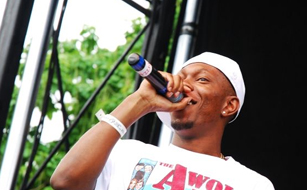Dizzee Rascal: Pitchfork Music Festival
By user • Jul 23rd, 2008 • Category: Concert ReviewsDizzee Rascal fans must be masochists. Why else would they cheer so loudly while being berated, laugh without remorse when the English performer lambasted a crewmember, and beg for more of both?
The Mercury Prize-winning MC’s set at the Pitchfork Music Festival was all but doomed from the start. Before the 22-year-old took the stage that Saturday afternoon, first-aid crews were called to help remove more than one person who had passed out in the shoulder-to-shoulder pit. It was a sign of things to come, and a telling one at that: the crowd clapped each time that a dazed concert-goer was passed through the mob toward waiting bouncers.
It was this selfish demeanor that echoed through the critically acclaimed grime artist’s set. From the moment Rascal, DJ Aaron LaCrate and simpatico-hype-man Scope, took to the stage, the performance was marked by tension. First, there was Rascal’s combative approach in dealing with the sound operator, asking him: “What kinda festival is this?” when his mic fed back. It was a relationship that came to a head after the brash youngster stopped mid-song to demand more music in the monitors, saying, “Turn the fucking music up in the speakers, you stupid?”
Then there were his constant pleas for the Chicago crowd to liven up, at several points dumbing down his audience and speaking to the cheering masses as if he were scolding a toddler. But his total disregard throughout his almost hour-long run never was more apparent than when pointing to the adjacent stage where the folksy Fleet Foxes had just finished. “I see you listening to that folk shit,” Rascal said, while shimmying a jig and adding some finger picking guitar noises for good measure. “Fuck that shit.”
For almost a dozen songs, the performer born Dylan Mills paraded around with this same combative vigor, leading call-and-response sessions with the huddled, sweaty horde. Although his approach in the studio is novel – combining his rough London upbringing into pop-savvy quips – his live persona relies too heavily on hip-hop stereotypes that border on parody. From his thick gold chain to his matching rings, Rascal was clad head-to-toe in tried-and-true garb that sells his innovative approach in the microphone short. Even his hat – fitted, all-white, and with a Pittsburgh Pirates logo tilted back to the left – was a version of the same one worn the night before by Public Enemy’s Chuck D. If he plans to be the trailblazer that he claims to be, harkening back to fashion and ideals as old as he is won’t knock down any new doors – they’ll just get him in ones that others opened decades before.
His throwback performance didn’t feel reverent; there wasn’t a sense of historical respect to the genre’s forefathers whom he clearly was mimicking. Even when he acknowledged the United States as the original “home of hip hop,” there was an aura that he could do it better. Mugging for the cameras, the well-built rapper removed his shirt and flexed his biceps in a bout of dimwitted, alpha male showboating that nearly overshadowed such fantastic songs as “Sirens”, “Jezebel”, “Jus’ A Rascal”, “Where’s Da G’s”, and “Fix Up Look Sharp.”
Picking from his three-album catalog, including the finally-available-stateside Math + English, Rascal and his partners in grime dipped and dodged their way into mediocrity by constantly reminding everyone how truly remarkable they were. There’s a thin line between confidence and ignorance, and each time Rascal opened his mouth instead of letting his high-energy songs speak for themselves, it was clear on which side he fell.
Soundcheck Magazine, July 2008

user is
Email this author | All posts by user

